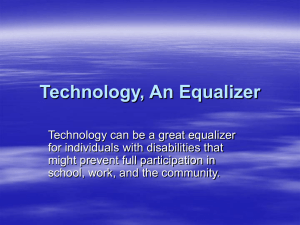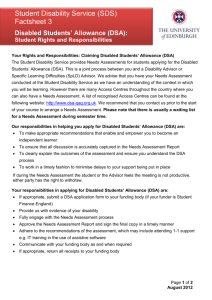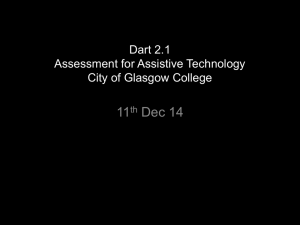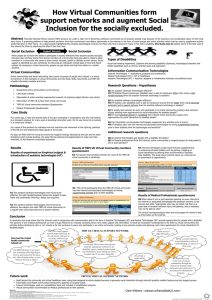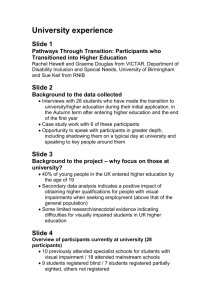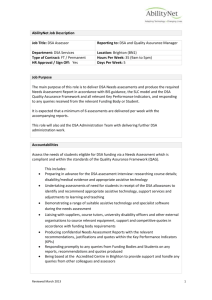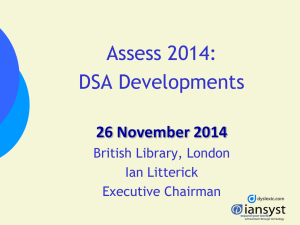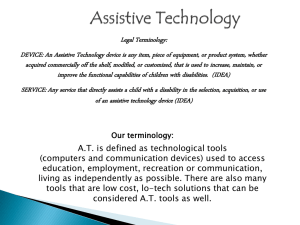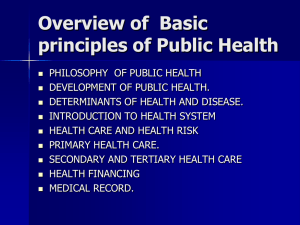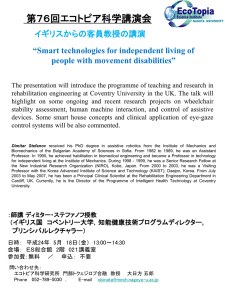the proposal in full here
advertisement
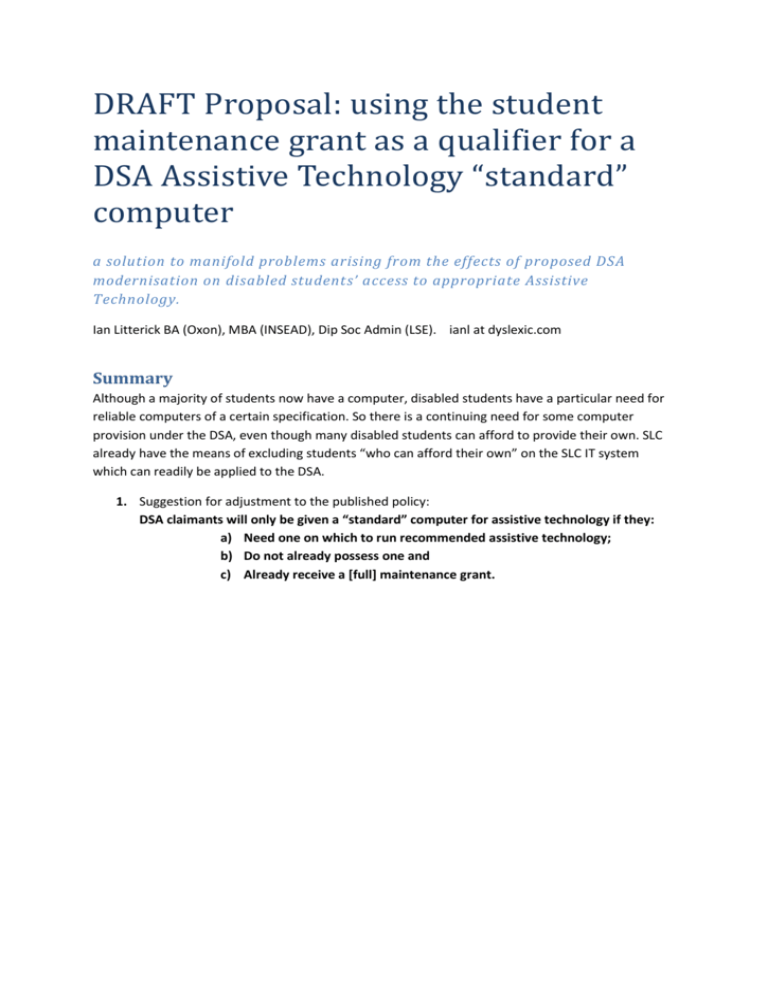
DRAFT Proposal: using the student maintenance grant as a qualifier for a DSA Assistive Technology “standard” computer a solution to manifold problems arising from the effects of proposed DSA modernisation on disabled students’ access to appropriate Assistive Technology. Ian Litterick BA (Oxon), MBA (INSEAD), Dip Soc Admin (LSE). ianl at dyslexic.com Summary Although a majority of students now have a computer, disabled students have a particular need for reliable computers of a certain specification. So there is a continuing need for some computer provision under the DSA, even though many disabled students can afford to provide their own. SLC already have the means of excluding students “who can afford their own” on the SLC IT system which can readily be applied to the DSA. 1. Suggestion for adjustment to the published policy: DSA claimants will only be given a “standard” computer for assistive technology if they: a) Need one on which to run recommended assistive technology; b) Do not already possess one and c) Already receive a [full] maintenance grant. Discussion: Given that: 2. Over 90% of students now have access to a computer of their own at university; 3. Many of these computers are sufficiently powerful to run most assistive technology software; 4. HMG considers that it is inequitable that students with a disability should ipso facto be given a computer by the state (if they haven’t already got a suitable one) when their nondisabled peers have to purchase one themselves; But: 5. Disabled students tend to be much more heavily reliant on their own personal computer then their non-disabled peers: b. Because it allows them to work independently; c. Because they have their own personal set up with Assistive technology and other tools, which are not easily replicated on another machine or a public machine; d. For other reasons dependent on their particular disability (eg a need for privacy; restricted mobility; concentration problems); 6. Disabled students, even those enjoying the DSA, are disadvantaged compared with their non-disabled peers because reading and writing tend to take longer, even when they are using appropriate assistive technology. a. For this reason the equipment supply one stop shop and quality assurance framework have been developed in response to students' requirements: b. In order to minimise the disabled person's penalty of having to schlep around sourcing and maintaining the various parts of their system including AT which they generally do not know enough about as consumers and cannot find on the High Street; c. In order to minimise the chances of a student being without the computer on which they are dependent; d. In order to minimise the frustrations caused by having sophisticated software on sophisticated equipment. ("It's a hardware problem,." says the software company. "No it's a software problem," says hardware support.) 7. Equipment suppliers have developed unique products and services, better, cheaper, and more convenient than those available on the high street, now enforced by a QAF: a. Course-long (up to 5 year), high-quality insurance, paid once; b. Course long extended warranties, paid once; c. Training and support on-site and on the student's own equipment; d. Included loan equipment, with the same setup, in the event of a student's own computer being away for repair; e. An independent system for objectively evaluating required computer specifications for particular assistive technology needs, (the "equipment matrix" which defines a "standard" -- "Workhorse" -- computer); f. All of which minimise the handicap of being disabled; DSA-AT-Grant-Proposal.docx p2 And although qualification on the basis of income is usually deprecated in disability circles: 8. Because it normally: a. Costs money to implement; b. Acts as a disincentive for disabled people to claim the product or service; c. And creates inequity between disabled people with incomes above the threshold who have to pay for the service, and non-disabled people who do not; And given further that: 9. There is a correlation between disability and low income, such that disabled students are less likely to be well off than their non-disabled peers; 10. So 48% of DSA claimants qualify for maximum student maintenance grant; 11. And so are less likely to be able to afford a computer of adequate performance; 12. about half of the computers that ATSPs "health check" today are in some way inadequate to run the assistive technology recommended; 13. That HEIs will certainly not be able to afford to provide a computer for every disabled student who will not qualify for one under the DSA; 14. It is clearly not the case that “…students will not lose out by these changes.” unless steps are taken methodically to ensure that all disabled students who can benefit from their own adequate computer can still get one. Unless: 15. Computers are still supplied but on the basis of qualifying for the maintenance grant: 16. This will ensure that well off students do not get a free computer just by dint of having a disability. 17. And so will significantly further reduce the number and cost of computers provided, beyond the current 40% reduction from the peak figure. 18. The normal objections to qualification on the basis of income do not apply in this case, so the understandable “knee jerk” opposition is not appropriate: a. The qualification test costs nothing, because it has already been applied: the income test for maintenance grant; b. And the results are already sitting on the very same computer system on which the DSA is processed; c. There is no disincentive to applicants because they have already undergone the income test in applying for a student grant if they need one; d. There is no inequity between disabled students above the threshold and nondisabled students because both are already expected to have a computer adequate to their needs anyway. e. Indeed in this case taking income into account helps to overcome the inequity that concerns the government whereby students who would normally pay for a decent computer anyway can get one paid for by the government. 19. It helps to preserve at least a part of what has been a world leading Assistive Technology programme. DSA-AT-Grant-Proposal.docx p3 So: 20. Policy suggestion: DSA claimants will no longer be given a “standard” computer for assistive technology unless they: a) need one on which to run recommended assistive technology; b) do not already possess one and c) already receive a maintenance grant. Savings We estimate that this would still enable BIS to save about £15m – about half of the current £30m equipment expenditure. So total savings from the peak year recorded in the Minister’s statement (2011-12 – equipment £45.5m) would be about £30m, a 2/3rds saving. DSA claimants by household income The following graph showing DSA claimants by household income as recorded in their maintenance grant application. 28% don’t declare an income, probably because they know they have too much for a maintenance grant. 21% have no income. The FOI bands don’t correspond exactly to the Maintenance Grant bands, so we have to estimate, but approximately 48% would qualify for a full maintenance grant (income under £25,000) and another 12% would qualify for some maintenance grant (income under £42,620). How many of those can be expected to fund a fully adequate AT computer, much less a complete system? Source SLC: FOI data 60-14.xls DSA-AT-Grant-Proposal.docx p4
